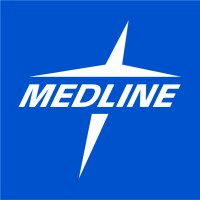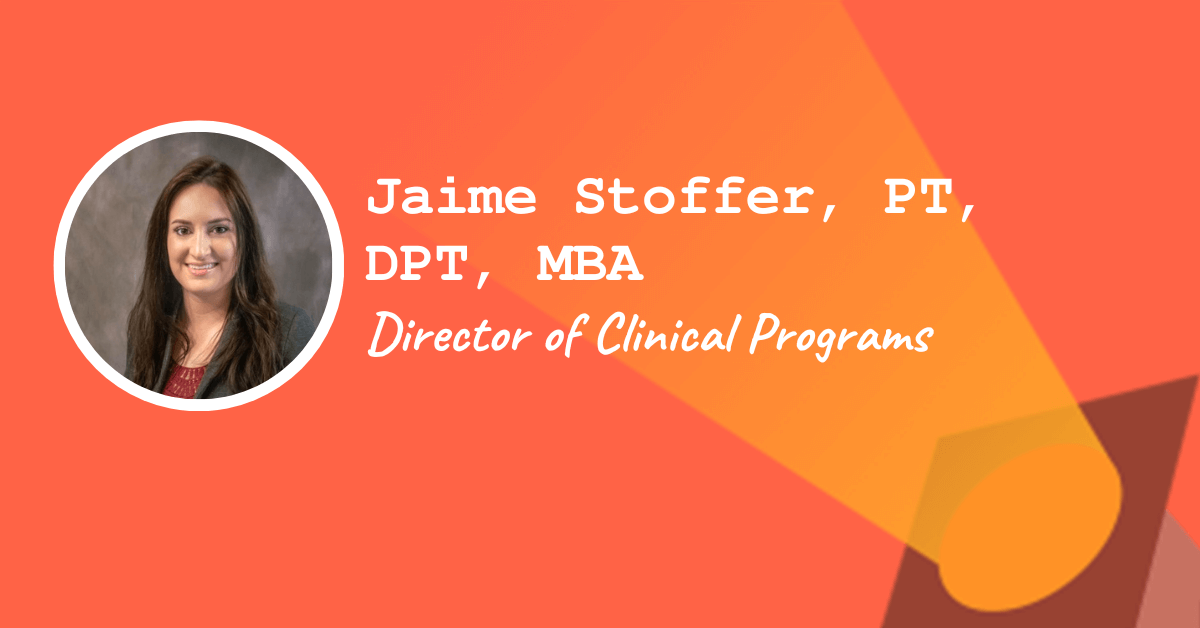This week’s spotlight is on Jaime Stoffer, PT, DPT, MBA, a non-clinical physical therapist who is now Director of Clinical Programs for Medline Industries!
This post may contain affiliate links or codes. This won’t increase your cost, but it helps keep TNCPT alive, and free of annoying ads! Thank you for your support. 🙂
What is your full name, title, and company name for your current, primary role?
Jaime Stoffer, PT, DPT, MBA — Director of Clinical Programs for Medline Industries

Where are you located?
Rootstown, Ohio
Where did you go to PT school?
Walsh University — North Canton, Ohio
Please refrain from contacting our spotlight participants on social media. There are thousands of readers just like you out there. 🙂 Please ask your questions in the comments on this blog post.
If you’re a Non-Clinical 101 student, you can network with many of our spotlight participants in the alumni groups!
What did you do when you first finished school, and for how long?
My initial job proved to be unexpectedly rewarding. While primarily focused on outpatient care, I also covered downtime and weekends in acute care and inpatient rehab.
This experience also exposed me to various specialties like pelvic health, pediatrics, and lymphedema, which significantly enhanced my career and professional exposure.
In what setting(s) did you work, and what types of patients did you treat?
Having sampled diverse areas, my curiosity soared. To tackle student loans, I juggled multiple jobs simultaneously, including:
- Home health
- Skilled nursing facilities
- Outpatient independent living and assisted living facilities
- Schools
- Home-based outpatient services
What did you enjoy about your early roles? What didn’t you enjoy?
Exploring the various facets of physical therapy was enriching. From shadowing therapists conducting home evaluations, engaging in work-site modifications, to functional capacity evaluations and OASIS completions, I was in a perpetual state of learning.
However, I sensed that I wasn’t optimizing my skill set to its fullest potential. The closer I got to business, marketing, and strategy, the more aligned I felt with what I believed I was meant to do.
When and why did you decide to do something non-clinical?
Eight years ago, the concept of a “non-clinical role” was unfamiliar to me. Armed with a physical therapy degree and a desire to transition towards business, I stumbled upon the fact that Theraband was manufactured just 30 minutes away from me. In my job search, I discovered an opportunity at their company and promptly applied.
What are you doing these days?
My primary role today is Clinical Programs Director for Medline, under the Rehab and Fall Prevention division. I also lead all the marketing efforts for our division. I primarily work as the liaison between product management and the sales specialists. I ensure we have a comprehensive product offering, work with product managers to market our offering, and provide education tools and resources to set us apart.
Are you still treating patients, or are you solely non-clinical?
Today, I am solely non-clinical. I carried a PRN position for quite a few years but stopped when my travel picked up and I moved.
How long have you been in your current role?
I’ve been in my current role at Medline for over four years.
Did you get any special certifications or training along the way to help you get into your current role?
I always get asked whether the MBA is worth it. For me, it set me apart as someone with knowledge beyond clinical practice. I selected a marketing focus and have used that marketing knowledge more than anything. I also pursued several certifications in social media management when my job duties expanded to social.
How did you find your job? Did you apply or find it through a connection?
I stumbled upon my first non-clinical position. It sounded interesting and was in the same direction I wanted to go. I didn’t realize then how lucky I was.
My second non-clinical role was the result of my network. Someone had referred me for a position, and my current company reached out to see if I would be interested.
I cannot stress enough how vital your network is.
What are some of the things you did to stand out, take initiative, and advance in your career?
I differentiate myself by being open to tackle any task, regardless of its size or complexity. My forte lies in finding effective solutions and completing the job.
This approach has helped me establish a reputation as someone who can handle diverse projects, spanning social media management, video shoots, product development, sales training, and trade show design and planning.
As a result, my name often comes up when someone needs a problem tackled that requires a variety of skills.
How have people reacted to you leaving patient care?
I’ve had mixed feelings about it, but a crucial principle I adhere to is not aiming to be the most knowledgeable clinician in a room filled with clinicians. Instead, I seek out experts in their respective fields and collaborate with them to translate their expertise into practical applications for the manufacturing and distribution industry. I believe that our combined knowledge is always more potent than either of us attempting it alone.
What’s a typical day or week in the life like for you? What types of tasks and responsibilities fill your time as director of clinical programs?
A significant shift I’ve experienced is the increased frequency of travel and meetings. I find myself consistently on the road, and my days are often heavily scheduled with various meetings.
Despite this, my projects range widely, from collaborating with a product manager on testing parameters for a new product to organizing a trade show and sharing our latest social media content on LinkedIn. The continuous variation and the opportunity to learn continually engage me in my work.
Additionally, I thoroughly enjoy the travel aspect, as it provides me with the opportunity to meet new people and expand my professional network. I’ve had the pleasure of connecting with incredible individuals in the industry, including clinicians and vendors.
What are some of the rewards of your role? What are the biggest challenges?
One of the most rewarding aspects of my role is contributing to the ongoing advancement of our profession. I have a broad perspective, get to see how many different clinics operate, stay informed about developments within our associations, and identify opportunities for lobbying efforts. I play a role in disseminating this knowledge and fostering awareness.
However, one of the significant challenges I face is learning when to pause. In my previous experience, I would finish seeing patients and complete documentation, and my work for the day was done. In the corporate world, it’s a different scenario. There’s always another project, email, meeting, or task demanding my attention. It can be challenging at times to disengage and take a break.
How did your clinical background prepare you for this director role? Which skills transferred?
Communication and marketing are probably the strongest skills I utilize the most. I had to be clear when communicating with my patients, and I had to market what I could bring to the community. I had to come up with creative ways to get the word out that our clinic was in the area when we opened. That same type of creativity sparked my interest in marketing.
We bring so many other skills to the non-clinical world as well, including multitasking, prioritization, selling our services, and even management skills.
Roughly speaking, how are the hours and pay compared to patient care?
The hours I put into non-clinical responsibilities are much longer than what I dedicated to patient care. I make a conscious effort to be transparent about this reality. When I’m on the road for the week, a standard 40-hour work week becomes non-existent. However, the satisfaction I derive from my work is more significant to me, and that takes precedence.
When I initially transitioned to my first non-clinical role, I accepted a pay cut. While I’ve since worked my way back up, it wasn’t without an initial sacrifice.
What type of person do you think would do well in your director of clinical programs role?
Adaptable personalities thrive in this domain. You need to be prepared to tackle any project, engage with any customer, and juggle multiple tasks simultaneously. Each day brings new challenges, and there’s always something demanding immediate attention.
Ready to launch your own non-clinical career?
Do you work remotely or onsite?
Does your organization hire PT, OT, or SLP professionals into non-clinical roles?
Yes, we hire for all sorts of roles!
Did you read any books, take any courses, or do anything special overall to get you where you are today?
Network. Network. Network. I heard this constantly in school but didn’t realize the power until I left. My network has proven to be invaluable. The added bonus is that many within it have become lifelong friends, bringing me immense joy.
What is a typical career path for someone in your director role?
I aspire to progress in my career by taking on larger leadership roles, with the ultimate goal of overseeing and running a business unit someday.
What is next for you? What are your high-level career aspirations?
I’m addicted to learning. Another certification or degree will likely appear on my resume. I hope to grow as a leader and continue to participate in as many learning opportunities as I can.
What would you teach to today’s graduate students in your profession, if you had the opportunity?
I would teach them business. Therapists are generally not strong at selling themselves or their services. Healthcare is a necessary business at the end of the day.
Do you have any special advice for others who want to follow in your footsteps?
Don’t be afraid of sales! This is the path that most say they aren’t interested in, and it can be a great transition into the corporate world.





